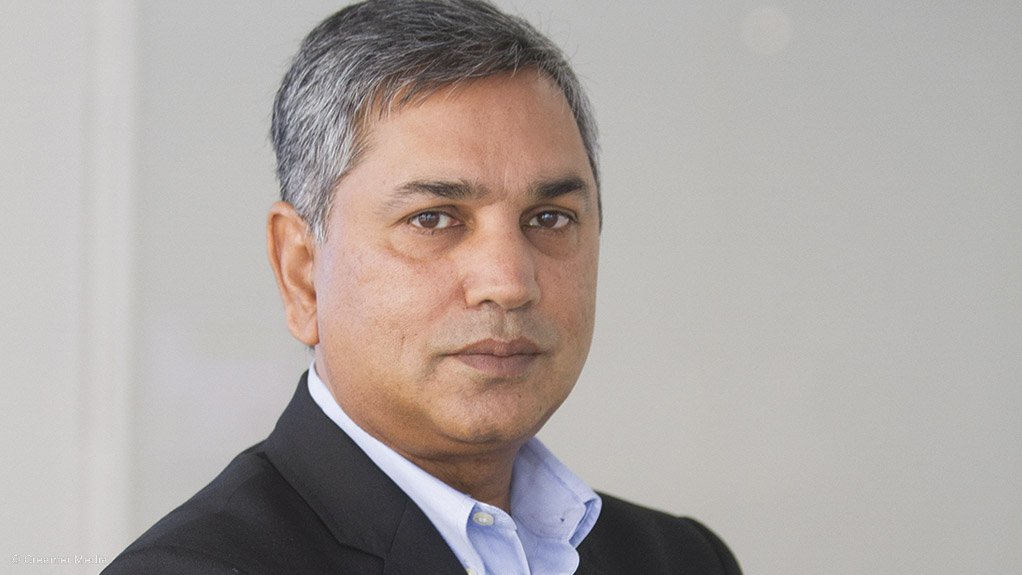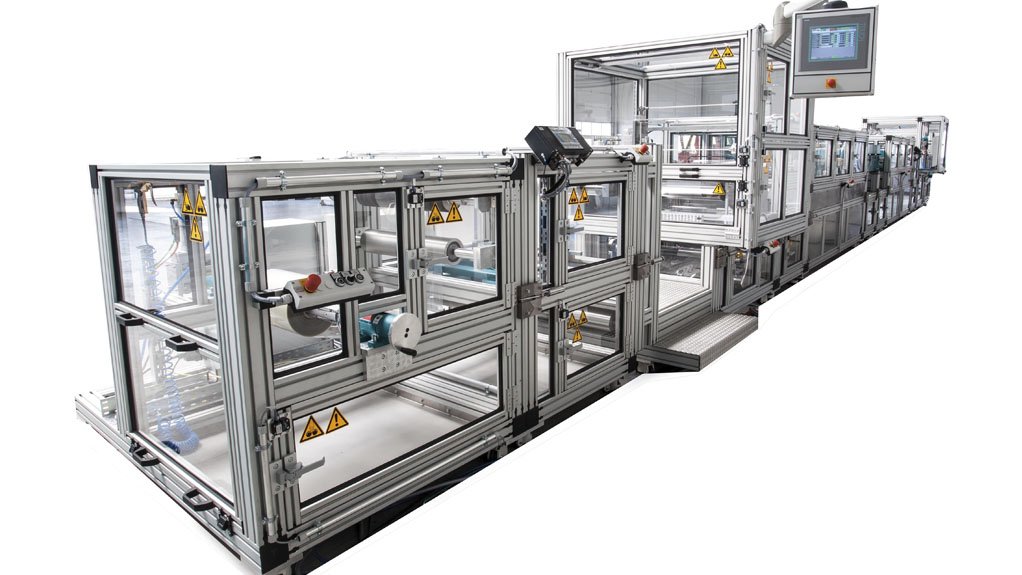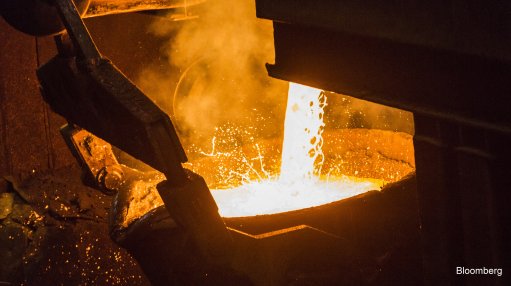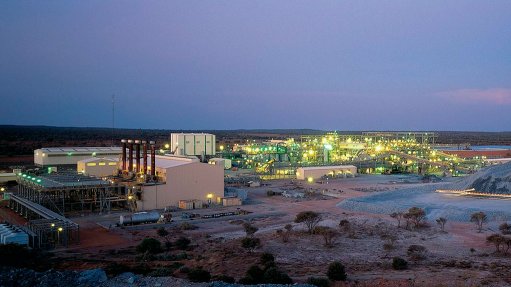Fuel cell opportunity to save platinum mining



VINAY SOMERA The drive to zero emissions also represent the “single biggest opportunity” for the industry
Photo by Duane Daws
LOCAL MANUFACTURING Isondo Precious Metais is focusing on creating a viable fuel cell and electrolyser component manufacturing base in South Africa
With platinum being one of the most effective and durable catalysts in proton exchange membrane fuel cell technology (PEMFC), fuel cell and electrolyser technology developer Isondo Precious Metals (IPM) CEO Vinay Somera believes that this presents an opportunity for the South African platinum mining industry to take control of new market demand creation.
“The platinum mining industry is facing an existential threat from the shift to zero-emissions vehicles based on the possible replacement of platinum catalysed internal combustion engines by battery electric vehicles which contain no platinum-group metals (PGMs),” he explains.
However, he adds that the drive to zero emissions also represents the “single-biggest opportunity” for the industry through the creation of a global hydrogen energy storage economy.
“Green energy stored in hydrogen will require fuel cell and electrolysers, both of which use PGMs as catalysts. Fuel cells convert hydrogen into electrical energy, while electrolysers convert water into hydrogen.”
Somera explains that a distinct advantage of fuel cells is that they can use various fuels from several sources.
“PEMFC can use hydrogen from renewables through the electrolysis of water or from the reformation of hydrocarbon fuels such as natural gas. A direct-methanol fuel cell (DMFC) can use methanol or biomethanol from locally produced biomass.”
He adds that only the PEMFC, DMFC and phosphoric acid fuel cell, known as PAFC, directly use PGMs containing catalysts, while some reformation technologies also contain PGMs and are, therefore, of local interest from a platinum beneficiation perspective.
Somera tells Mining Weekly that energy storage is a rapidly growing area of interest globally and, in particular, the storage of hydrogen.
“Some of the major global economies are shifting towards hydrogen storage, which will help create a significant market base for fuel cells as the pre-eminent technology for converting hydrogen into electricity,” Somera explains.
This presents a vital opportunity for South Africa to cement its place as a global leader in this field, for example, by using its solar resource to create hydrogen, as well as using its platinum resource to produce PGM-bearing fuel cell components.
IPM is focusing on creating a viable fuel cell and electrolyser component manufacturing base in South Africa, as well as global deployment strategies for such technologies, to enable hydrogen generation and storage, he notes.
IPM COO Dr Sakib Khan notes that hydrogen is key to the global fossil fuel industry, as hydrogen can be extracted from existing fossil fuels as a stepping stone to a zero-emissions world.
Khan further explains that the hydrogen economy is important – globally – as it presents the roadmap of least disruption to get to the zero-emissions goals of the Paris Agreement, which is already being implemented by many nations and global cities.
In July, for instance, France’s Environment Minister Nicolas Hulot announced the country’s five-year plan to ban all petrol and diesel vehicles, which use PGMs, by 2040 as part of the Paris Agreement.
However, Somera adds that, despite the shift away from using combustible fuels, “the future automotive world is not going to be dominated by one technology type – we are entering an era of multiple vehicle propulsion types.”
He suggests that the automotive industry in the near-term will comprise a large complement of battery-electric vehicles (BEVs), fuel cell electric vehicles (FCEVs) and petrol/diesel hybrid vehicles.
Khan says a combination of different technologies is necessary because of the characteristics and use of the aforementioned technologies.
“Imagine a small city saloon car. It has a battery, because it’s electric, and that battery weighs 200 kg. If you want to increase the range of this small city car, which is typically about 135 km when using battery-electric, you could add more battery [power] – the car will go further, but it will be heavier, thereby reducing the benefit of a bigger battery.”
Khan states that to increase the driving range of a FCEV one just needs to add additional hydrogen or higher-pressure storage. He notes that, ideally, using smaller BEVs make sense for city-centre driving, but becomes less viable when considering long distances.
Khan points out that, in a heavy multi-wheel haulage-truck scenario, the economics become absurd.
“Haulage trucks typically need to lower the weight of the vehicle to carry the maximum load of cargo. The truck owner cannot afford to have limited range of travel with battery-electric power, as it would necessitate a stop every few hours to recharge, so they would need to add many large additional batteries to try reach a range comparable to today’s diesel trucks. However, by the time they get to that range, they’re not moving cargo, they’re moving batteries.”
Although, a saloon fuel cell car uses about 5 kg of hydrogen to travel about 500 km. Khan explains that the range of the vehicle can be increased by fuelling the vehicle with 7 kg of hydrogen, “just under a higher pressure”, taking up the same space as 5 kg of hydrogen, “just at a higher pressure”. As such, increasing the amount of gas does not necessarily change the weight of the car – “it may add a few additional kilograms at worst” – it changes the pressure of hydrogen required within the same volume.
Based on these examples, Khan states that, for larger and heavier vehicles, the use of hydrogen fuel cells make sense – the increase in weight to increase driving range is negligable and the vehicles can be refilled in three minutes.
Whereas small BEVs could prove more feasible for small city cars – they do not need much range, so it does not matter that the battery charges overnight.
Khan says the shift toward a zero-emissions world is “irreversible and inevitable”
. But
, he adds that BEVs and FCEVs will require new infrastructure [for mass roll-out] in the form of hydrogen refueling stations for FCEVs and more robust electrical grid infrastructure for BEVs.
Therefore, it is imperative for the South African government, as well as South African industries, including mining, to embrace the hydrogen economy, which will increase the demand for fuel cells and thereby, increase the demand for PGMs.
He concludes that embracing the hydrogen economy will ensure that fuel cells remain relevant and that they are used not only in vehicles but also for stationary power such as electricity generation for homes, and commercial and industrial buildings.
Comments
Press Office
Announcements
What's On
Subscribe to improve your user experience...
Option 1 (equivalent of R125 a month):
Receive a weekly copy of Creamer Media's Engineering News & Mining Weekly magazine
(print copy for those in South Africa and e-magazine for those outside of South Africa)
Receive daily email newsletters
Access to full search results
Access archive of magazine back copies
Access to Projects in Progress
Access to ONE Research Report of your choice in PDF format
Option 2 (equivalent of R375 a month):
All benefits from Option 1
PLUS
Access to Creamer Media's Research Channel Africa for ALL Research Reports, in PDF format, on various industrial and mining sectors
including Electricity; Water; Energy Transition; Hydrogen; Roads, Rail and Ports; Coal; Gold; Platinum; Battery Metals; etc.
Already a subscriber?
Forgotten your password?
Receive weekly copy of Creamer Media's Engineering News & Mining Weekly magazine (print copy for those in South Africa and e-magazine for those outside of South Africa)
➕
Recieve daily email newsletters
➕
Access to full search results
➕
Access archive of magazine back copies
➕
Access to Projects in Progress
➕
Access to ONE Research Report of your choice in PDF format
RESEARCH CHANNEL AFRICA
R4500 (equivalent of R375 a month)
SUBSCRIBEAll benefits from Option 1
➕
Access to Creamer Media's Research Channel Africa for ALL Research Reports on various industrial and mining sectors, in PDF format, including on:
Electricity
➕
Water
➕
Energy Transition
➕
Hydrogen
➕
Roads, Rail and Ports
➕
Coal
➕
Gold
➕
Platinum
➕
Battery Metals
➕
etc.
Receive all benefits from Option 1 or Option 2 delivered to numerous people at your company
➕
Multiple User names and Passwords for simultaneous log-ins
➕
Intranet integration access to all in your organisation




















